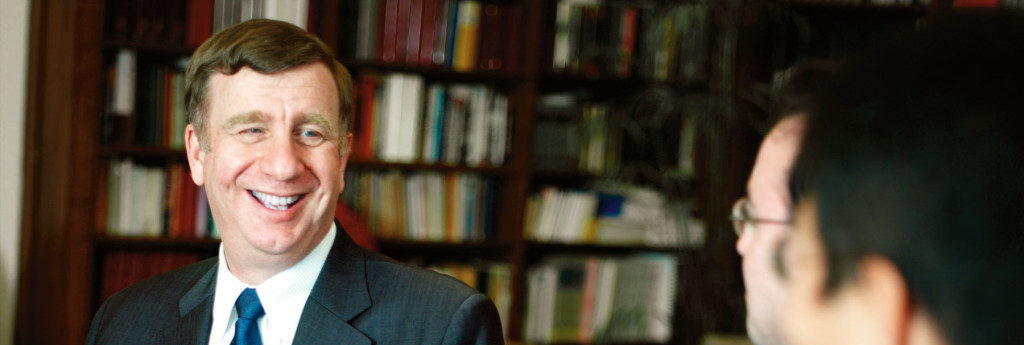Dr. Fengming Cui
Director, China Program, Harvard Law School Project on Disability
Bill Alford, A True Friend of Persons with Disabilities
It is both exciting and difficult to decide what to select for this tribute with a focus on Professor Bill Alford in his disability work. Before us, there is a very telling and meaningful picture of his heartful commitment to disability work as the Chair and co-founder of Harvard Law School Project on Disability (HPOD) since 2004 and a member of the Board of Directors of Special Olympics since 2005. His impact on the lives of persons with disabilities is beyond borders. Back home in China, it is fair to say that Professor Alford has had a huge impact on clinical and classroom education on disability rights through collaborating with law schools in China. His passion for disability rights and social inclusion draw attention of Chinese experts and students in law and other domains to this originally marginalized area in the context. Meanwhile, as one of his colleagues for over a decade, I have had a valuable opportunity to engage with Professor Alford regularly for our disability work, which allows me to see his sober and personal yet powerful specifics of disability related scenarios. Those moments utterly indicated his concerns of injustice persons with disabilities experience as well as treasure of their aspirations and gifts to humanity often ignored or despised.
One of the most important aspects of HPOD’s projects in different countries is to promote equal participation of persons with disabilities through their representative organizations (DPO). This approach consistently echoes the motto of the drafting of the 2006 UN Convention on the Rights of Persons with Disabilities (CRPD) “nothing about us without us,” The concept of “empowerment and participatory decision making” is at the core of the CRPD to combat long-lasting traditional system of representative decision making. Because of this, our team seeks opportunities to engage with many DPO leaders from different cultural and societal background.
To give an example from China, several DPO friends there shared how they felt about meeting with Professor Alford: He showed respect to them with gentleness and humility, listened to them very closely with keen interest in learning from their lived experience and wisdom, valued DPOs’ hard work and strength and encouraged them to believe in their leading roles in promoting disability human rights, and was clearly mindful of actual human side of disability work. They felt that they were involved not as decoration for a disability project and recipients of teaching and academic support, but as active participants, leaders, and contributors to share the ownership of a rewarding course to break down barriers and promote understanding of disability. Professor Alford naturally inspired a mutual learning experience with persons with disabilities and experts in the field in China.
I am also blessed to have him as my mentor and friend as he calls me. Professor Alford influenced my career pursuit and scaffolded me to live out a purposeful life as a disability studies scholar and self-advocate of disability rights, human dignity, and full social inclusion, I remember my initial conversations with Professor Alford about my comparative disability policy research on inclusive education in relation to China in 2006. Back then, I was pursuing my doctoral degree in special education at Boston University. It was also a transformation ear of the concurrent naming and definition shift from mental retardation to intellectual disability, thanks to the joint efforts of self-advocates and their families with the strong support from scholars in the field.
In one of our conversations, Professor Alford reminded me firmly to avoid “mental retardation”, called the term “insulting”. As someone like myself who happens to have a physical disability and was once called a “残废” (pronounced as “can fei,” meaning “impaired and useless”), I know that naming and definition matter significantly. His reminder was so cool and uplifting to me, whose desire is to claim human dignity and contribute to concrete disability inclusion social change. It showed how serious and consistent he was about combating the trend of word stigmatization persons with disabilities suffer from not only in academic usage but also in daily lives. Yet this was happening and still is in the context in which persons with disabilities and their families alone with their supporters come a long way to fight for dignity in form of people first language. After this encounter, disability terminology research becomes one of core areas of my scholarly interest. I have learned how difficult it is to reverse the tide of impairment/defect first language and how common it is to trivialize the problem of conceptualization regarding disability.
Another scenario was in the activities of the Special Olympics International. After I joined HPOD in 2008 after my graduation, I began to have regular involvement in the work to support Special Olympics together with my colleagues. I served as a volunteer for several Special Olympics Games in different countries. One of the programs I signed up was called “May I serve you?” a unique opportunity to wear an apron and engage with athletes with intellectual disabilities at breakfast time. Professor Alford was always there. There is probably nothing too special about being there if you have chosen to participate the games as a fan of the Special Olympics. But it was powerful for me to see Professor Alford engaging with athletes as a close friend, a fan, and an admirer. This snapshot is important to people with disabilities, especially those with intellectual disabilities, who have always been subjected to tragic discrimination, stigma, and rejection.
My tribute is but a small view of Professor Alford’s heart for and devotion to making the world a better place for all through disability human rights and inclusion. I hope that it may serve as a warm and sincere invitation for you to continue to follow and join his efforts.

